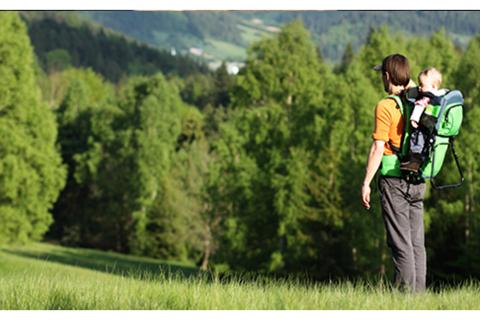
Hiking as a family is a wonderful experience. You will bond on the trail and get to spend some time together enjoying the great outdoors. But if you are not prepared for the special circumstances of hiking with little ones, your adventure could become a nightmare.
These tips will make hiking with young kids a fun experience for the entire family.
Choosing A Route
If you are hiking with a baby, you will need either a sturdy backpack-style carrier or a stroller that can handle rough terrain. When choosing your route, do not underestimate how much the extra weight of the baby could tire you out.
If you are hitting the trail with kids old enough to trek on foot, start slowly with short distances that are manageable for tiny legs. Do not push too hard or too fast. When in doubt, underestimate the hiking stamina of your child - unless you do not mind carrying him or her for a portion of the trek.
While the abilities of your child should be the number-one consideration when selecting your hiking route, remember that your own abilities will be affected as well, since you will be toting more gear than you would on a hike without kids. To make it easy on everyone, select a hike with minimal elevation change.
While it may be tempting to try that trail across town, stay a little closer to home, at least until your child gets adjusted to hiking and really enjoys your adventures together. Between naptimes, mealtimes, bathroom breaks and the weather, it is easier on everyone if you can get home quickly if necessary.
What to Bring
No matter how short your hike will be, bring a roomy day pack with a stash of the essentials. To streamline your load, opt for a pack with a hydration system built into it and loaded up with plenty of water for both you and your child. Other necessities include:
Snacks. Bring more than you think you will need and plan to take a few snack breaks, even if you think your little one can make it round trip without stopping. Granola bars, fruit leather, applesauce pouches and freeze-dried fruit are good options.
Extra baby wipes and toilet paper. It is just a good idea.
Trash bags. Always take your trash with you for proper disposal.
Protection from the elements. Take things such as ponchos, hats, sunglasses and sunscreen.
A first-aid kit. It should have all the basics, including hand sanitizer, an instant cold pack, bandages and allergy medication.
Extras for baby.
When hiking with a baby, plan to load your day pack with an abbreviated version of your diaper bag, including two more diapers than you think you will need, wipes, a burp cloth, a pacifier and, if not breastfeeding, a bottle with formula. Bring along a spare onesie, extra socks and a light blanket in case of a blowout or change in weather.
Add In Some Extra Fun
Look for ways to tailor the experience to your the specific interests of your child. For some, this might mean stopping for a swim in the creek or for a picnic. For others, this might mean singalongs, geocaching and looking for lizards. No matter which activity you choose, by varying the focus, you will stretch your the hiking attention span of your child a bit and help the entire adventure be remembered in a more positive light.
Slow Down
Let your kids set the pace, instead of trying to get them to keep up with you. Forcing your children to try to go faster than they would naturally will leave them too focused on trying to keep up than on enjoying themselves.
Walk side by side and take this as an opportunity to have some meaningful conversation with your kids. Ask questions and take the time to listen to the answers. Disconnecting from your gadgets and slowing down to stop and enjoy your surroundings can create fertile ground for deeper connection, no matter what your age.
- 380 views

